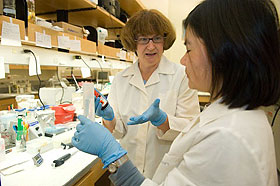  |
| HOME | THIS ISSUE | CALENDAR | GRANTS | BACK ISSUES | < BACK | NEXT > |
Cell biologist honored for membrane protein researchby Cindy Weiss - January 26, 2009
|
||||
| Debra A. Kendall, Board of Trustees Distinguished Professor of Molecular and Cell Biology and associate dean of the College of Liberal Arts and Sciences, has been elected a fellow of the American Association for the Advancement of Science (AAAS). The AAAS is the world’s largest general scientific society. It is the publisher of the journal Science. Kendall’s research focuses on cellular activities that take place at the cell membrane, an area of study that has grown rapidly in the past decade, as scientists learn how information is transmitted from outside to inside the cell. That information can determine how drugs and therapeutic treatments are designed. She was cited by the AAAS “for distinguished contributions to the field of membrane protein biochemistry, particularly for advances in protein transport and signal transduction systems.” Developing new strategies She collaborates widely with other researchers at UConn, Yale, Dartmouth, and in the Netherlands and France. “The research questions have demanded that we develop new approaches, new techniques, new strategies,” she says. “I’ve been extraordinarily fortunate to have good collaborators. We help each other out in all sorts of ways.” One of the challenges of her research in a fast-moving area is developing strategies to study the proteins that she is interested in. Membrane proteins are not water soluble, as are most proteins. Most research methodologies were developed for water-soluble proteins. In recent years, when scientists began to realize that the cell membrane was far more than just a barrier, new techniques have been sought to study the biological activities that take place at the membrane. Potential applications
They are also often targets for therapeutic agents, or drugs. They can bind specifically to therapeutic agents, reducing side effects. In one current project, Kendall and her research group study the cannabinoid receptor, a membrane protein found in the cells of the human nervous system. While most receptors are inactive until a compound binds to them, the cannabinoid receptor is slightly active even in the absence of a binding compound. Researchers have been able to manipulate it to be either more active or inactive. Kendall says a French drug company has developed a compound to inactivate it, leading to inhibition of appetite and obsessive behaviors such as smoking and drinking alcohol. Her research group is studying the shape, structure, and stability of the receptor in both active and inactive forms. Ultimately, this will help in developing therapeutic agents that can bind to the protein and take advantage of its characteristics. Kendall is an editor for the Public Library of Science (PLoS) and recently completed a term on the editorial board of the Journal of Biological Chemistry. She is a regular reviewer for NIH. A graduate of Smith College in biochemistry, she received her Ph.D. from Northwestern University, followed by postdoctoral study at Rockefeller University. She has taught at UConn since 1989 and has been active in mentoring minority students and young women beginning their science careers. A former chair of the University Senate Executive Committee, she is currently an associate dean of CLAS. To hear a podcast of Kendall talking about her research, go to http://www.clas.uconn.edu/facultysnapshots/podcasts/kendall.mp3 |
| ADVANCE HOME UCONN HOME |

